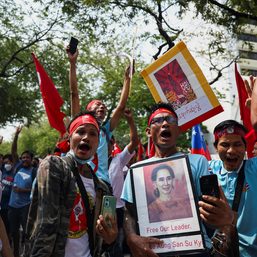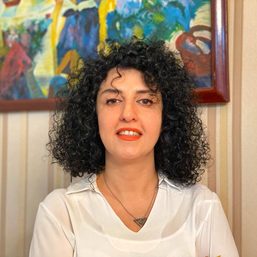SUMMARY
This is AI generated summarization, which may have errors. For context, always refer to the full article.
After several years of scandals and wildcard picks, the Swedish Academy will on Thursday, October 8, crown the 2020 Nobel Literature Prize laureate, with literary experts hedging their bets due to the unpredictability of the exercise.
Ahead of the announcement due at 1 pm (1100 GMT), betting sites like Ladbrokes and Betsson have French Guadeloupean author Maryse Conde, Canadian and Russian novelists Margaret Atwood and Lyudmila Ulitskaya, as well as Japanese writer Haruki Murakami, as the names to beat.
Speculation in Stockholm’s literary circles meanwhile covers a long list of names, including Caribbean-American author Jamaica Kincaid, Canadian poet Anne Carson, Kenyan writer Ngugi wa Thiong’o, and Hungary’s Peter Nadas and Laszlo Krasznahorkai.
The Academy has a history of throwing curve balls with its picks – as in 2016 when it honored US rock legend Bob Dylan.
Last year’s choice of Austrian novelist Peter Handke also unleashed a flood of criticism, leaving many wondering how it could award a writer known for supporting Serbian leader Slobodan Milosevic in the Balkan wars and playing down his army’s atrocities.
That pick was made even more puzzling by the fact that the literary institution was expected to avoid ruffling any feathers, as it recovered from a devastating, drawn-out scandal after the husband of one of its members was jailed for rape.
The scandal, which erupted in 2017 forced it to postpone the 2018 prize – a first in 70 years.
Dusted off candidates?
The Academy defended its choice of Handke as one based solely on literary merit.
The culture editor of Sweden’s biggest daily Bjorn Wiman called the choice of Handke “terribly bad,” adding: “If the Academy knows what is good for them, they’ll choose Jamaica Kincaid” this year.
Writing about themes like colonialism, racism, and gender, “her stance on various moral and political issues are absolutely worth listening to today,” he told AFP.
However, if last year’s choice is anything to go by, the Academy may also “dust off some old candidate” from years ago, “the same way they did with Handke.”
That could include such names as Peter Nadas of Hungary, Albania’s Ismael Kadare, and Romania’s Mircea Cartarescu.
Some of the “usual suspects” for the prize are Joyce Carol Oates and Marilynne Robinson of the US, Israel’s David Grossman, and South Korean poet Ko Un.
Lisa Irenius, culture editor for Svenska Dagbladet, and Ida Olmedal, culture editor for newspaper Sydsvenskan, meanwhile told news agency TT that Ko Un seemed like the only potentially scandalous name, referring to allegations of sexual misconduct levied at the poet in the wake of the #MeToo movement.
Mysterious ways
The Swedish Academy often seems to shun bestselling mainstream authors, opting to shine its spotlight on lesser-known names.
“If you’re sitting on all this prize money to award, and you have all this attention that you can bestow, then of course you might think…that it’s more fun to give it to someone who’s not already in the limelight,” Madelaine Levy, literature critic at Svenska Dagbladet, told AFP.
She agreed Kincaid could be a potential winner, calling her an “unbelievably musical writer who’s easy to love.”
But at the end of the day, she noted, “almost all countries have some unbelievably strong writers worthy of a Nobel prize.
“The Academy has surprised everyone many, many times. They work in mysterious ways,” she concluded.
The Nobel Prize comes with a medal and a prize sum of 10 million Swedish kronor (about $1.1 million, 950,000 euros).
Normally, winners receive their Nobel from King Carl XVI Gustaf at a formal ceremony in Stockholm on December 10, but the pandemic means it has been replaced with a televised ceremony showing the laureates receiving their awards in their home countries.
According to Anna Tullberg at public broadcaster Sveriges Radio, the unusual circumstances could be the perfect occasion to honor American novelist Thomas Pynchon, who famously shuns the limelight.
“A canceled award ceremony and a canceled banquet. Well there won’t be a better time to give the award to this very reclusive author,” Tullberg said.
Add a comment
How does this make you feel?





There are no comments yet. Add your comment to start the conversation.